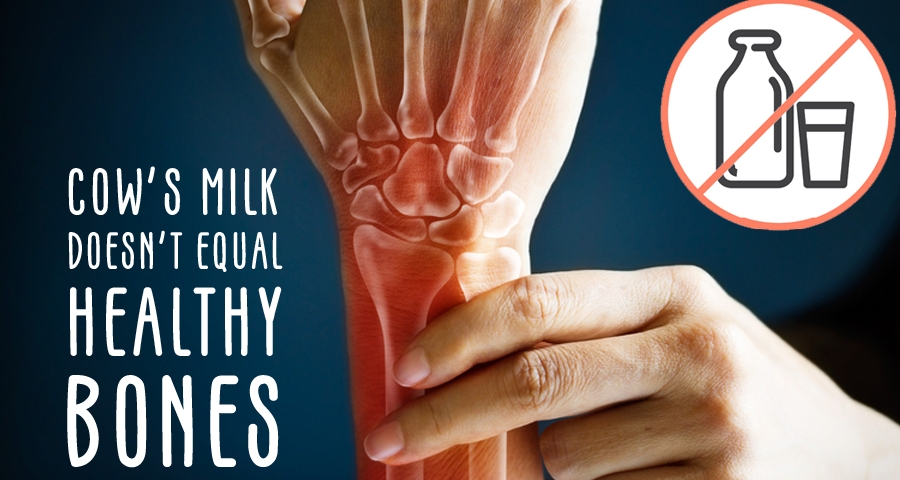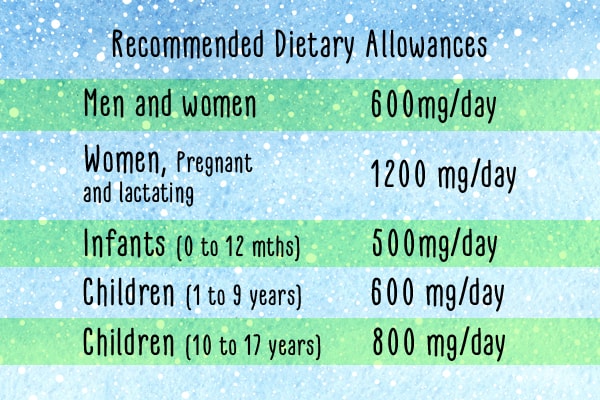Download Free Vegan Starter Kit -

Healthy Bones - The Non Dairy Way
"The human body has no more need for cows' milk than it does for dogs' milk, horses' milk, or giraffes' milk." Michael Klaper, MD
-min.jpg)
As I was growing up, I remember drinking three glasses of milk. A glass of cold chocolate milkshake was my go-to beverage.
I believed that cow's milk is essential; it helped meet my calcium needs and would make my bones healthy and strong.
I tried new ways to 'make' milk enjoyable and if I missed consuming milk even for a day, my family would be concerned.
What is remarkable, as I learned, is that there is substantial evidence that contradicts the claim that milk wards-off fractures.
What is even more remarkable is that till date, the connection between milk and bone health has been the cornerstone of dairy advertising.
The number of people in India alone suffering from osteoporosis (the brittle bone disease that can lead to fractures from even minimal trauma – referred to as a bone-thinning condition) was estimated by experts to be a staggering 36 million in 2013.
Not to mention the pervasiveness of dairy products – whether the cheese in our sandwiches, pizzas, and pasta, buttermilk after meals, butter on toast, cereal with milk, ice-creams, and sweets, or the like.
So, what about the protection dairy should provide?
-min.jpg)
A twelve-year study among more than 77,000 women, aged 34 through 59 years, showed that increased milk consumption did not protect against increased fracture risk when compared with those who drank little or no milk.
Similarly, the Harvard Nurses’ Health Study followed more than 72,000 women for eighteen years and showed that increased milk consumption provided no protective effect on fracture risk.
As we can see, contrary to popular belief, dairy calcium is not necessary for bone health.
-min.jpg)
While dairy products do contain calcium, we only absorb about 30 to 32 percent of the calcium available from them. And dairy products can make life very challenging. Cow’s milk is designed to make calves grow to full size in twelve months. Good for calves but not for us.
Dairy contains saturated fat, animal protein, cholesterol, and hormones making them an unfavourable choice for obtaining calcium (and yes, we do need another note dedicated to the challenges of consuming dairy).
Benjamin Spock, MD, one of the most trusted paediatricians of all time revised the seventh edition of his world-famous book, ‘Dr. Spock’s Baby and Child Care’ and advocated not to give dairy foods to children. He says, “Other calcium sources offer many advantages that dairy products do not have.''
So, where will I get my calcium?
-min.jpg)
Victoria Moran, bestselling author of twelve books including the ‘Main Street Vegan’ says:
“You’ll get your calcium the same place the cow got hers – from greens and other plants.”
Reflect on it - the strongest animals on the planet are plant eaters and their muscles, and strong bones are from grazing on plants and other vegetation.
When we get our calcium – directly from the source – from the dark green vegetables, beans, seeds, and nuts – we also get the fiber, minerals, vitamins, and antioxidants – important to enhance our overall health.
Also, we absorb 50 to 60 percent of the calcium from many green vegetables – that is almost double the rate of absorption than dairy calcium.
Here are some infographics:

The recommended dietary allowances for calcium as per the National Institute of Nutrition in India in milligram/day (mg/d)
-min.jpg)
few readily available plant-based calcium sources for ready reference.
-min.jpg)
Source: Calcium needs from the Indian Institute of Nutrition. Calcium amounts from the USDA nutrient database or labels.
So, the next time you force yourself or your child to have a glass of cow’s milk – instead have fun making a green smoothie or a mango almond milkshake. Say no to ghee and butter and give way to almond butter and sesame butter (tahini).
Enjoy your greens in a variety of ways and snack on delicious mixed bean salads/ chaat. Include delicious hummus, salsa, and peanut butter as part of your dips and go for the versatile Tofu instead of cottage cheese (paneer). There are endless possibilities – and fun as you attend to your health.
Healthy bones – more than just calcium?
-min.jpg)
Our bones don’t thrive on calcium alone. We need superior nutrition and exercises for bone health.
1. Top of the list is Vitamin D. Vitamin D helps with calcium absorption. Without Vitamin D, we absorb only 10-15 percent of the dietary calcium. We get vitamin D from the sun. Experts suggest 15-30 minutes of midday sun (10 am to 3 pm) on our arms and legs without sunscreen three to five times a week (15 for those with lighter skin; 30 for those with darker skin).
It is important to check our Vitamin D levels at regular intervals and supplement under the supervision of a medical professional. The good news is that we do have plant-based Vitamin D3 supplements available now.
2. We need adequate amounts of magnesium (abundant in vegetables, fruits, whole grains, and nuts), Vitamins K and C (green vegetables and fruits), and vitamin B12 (check levels, and eat adequate B12 fortified foods or supplement).
3. Soaking our seeds, nuts, beans, lentils, and whole grains for a couple of hours enhances absorption of calcium and other minerals. Also, steaming our food leads to greater retention of nutrients.
4. And exercise - the best ways to build bone density are to include strength building activities, resistance exercises, or aerobics three times a week for twenty minutes. Walking, jogging, and dancing are all activities that strengthen our bones.
Rest of the story
It is not only essential to have and absorb enough calcium, but it is equally important to keep calcium in our bones. It’s best to avoid excess salt and caffeine and stay away from soda, and soft drinks to keep your calcium in your bones. Avoiding highly processed and packaged foods, with excess salt will help us hold on to the calcium better.
No more weak bones
-min.jpg)
My personal experience of suffering from two shoulder injuries taught me a lot more about bone health and strength – in real life. The improvement I am witnessing as I heal one of my shoulders is substantial.
The difference is that now resistance building exercises form the core part of my strength building routine and my meals provide superior nutrition through a whole food, plant-based diet.
I stay on top of my Vitamin D and B12 levels and say a big NO-thank-you to dairy products (with confidence).
I enjoy sharing my journey as a wellness crusader with all of you lovely readers – with the aim to bring in more nutrition, health, wellness, compassion and joy in our lives.
Now, it’s your turn - Have you seen a change in your and your child’s overall health after removing dairy from your life? What are your healthy alternatives to dairy calcium?
Like this article?
Read: Are you Meeting your nutrition Values on a vegan diet
Read More: 9 health benefits of swimming
AUTHOR

Explore
Contact Us
About Us
Stay Connected
Copyright ⓒ 2017-2023. VEGAN PASSION PRIVATE LIMITED. All Rights reserved.
For more information, please write to hello@veganfirst.com
Registered Office Address: 55, 2nd floor, lane 2, Westend Marg, Saidullajab, Near Saket Metro Station, New Delhi, Gadaipur, New Delhi South West Delhi, DL




